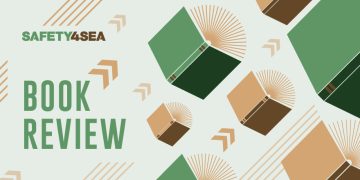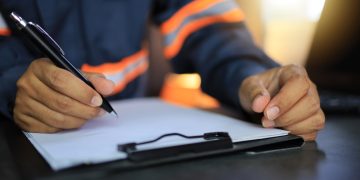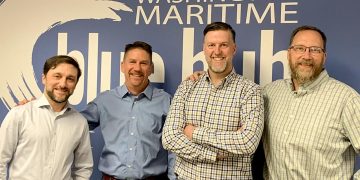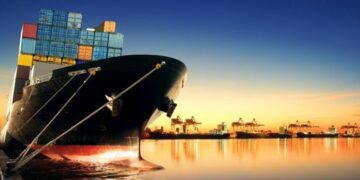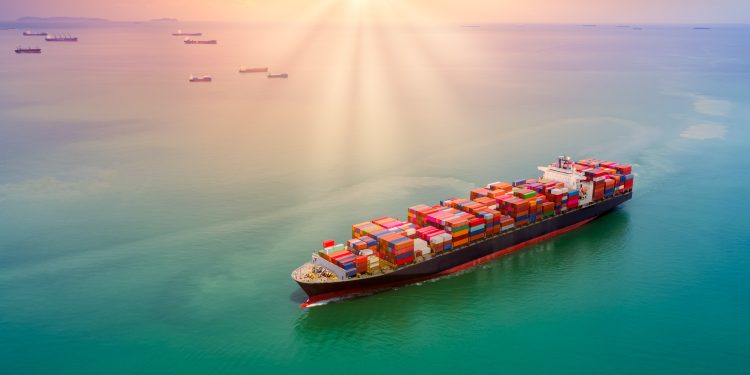During the 2024 SAFETY4SEA Limassol Forum, Dr. Chara Georgopoulou, Senior Research Engineer II and Head of Maritime DNV R&D and Advisory, Greece, focused on the changes and challenges that increasing decarbonization and its relevant regulation have posed to the maritime industry.
Integrating various perspectives on maritime decarbonization requires not only connecting different aspects but also delving into the intricacies of the process. Additionally, addressing specific challenges becomes essential, particularly focusing on the implications of new regulations.
Navigating the regulatory landscape
The International Maritime Organization’s (IMO) 2023 Greenhouse Gas Strategy, with its ambitious target of achieving zero emissions by 2050, sets a high bar. This necessitates drastic changes in ship design and operations.
IMO’s strategy focuses on a per year reduction, either through the Carbon Intensity Indicator (CII) or through other regulations that tend to gather data, use new technologies, and create more requirements for reporting.
The effect extends to the regulations under the European Green Deal, such as Fuel EU Maritime, which stresses the need for shifts in fuel and propulsion systems.
These regulations have a multilateral impact, influencing ship design and introducing innovative technologies such as carbon capture.
Redefining risk and accountability
Unlike the past, where fuel-related concerns were the cargo owner’s burden, new regulations now incorporate carbon risk into vessel operations, affecting vessel design and financial attractiveness for charterers.
Consequently, this regulatory context reshapes the landscape for ship management, ownership, and operation, introducing accountability, reporting requirements, and metrics for greenhouse gas emissions.
This complex environment creates various challenges for the future but also new potential for innovative technologies’ uptake. Furthermore, all these new fields create a prosperous ground for new jobs in the maritime industry.
While fuel concerns were traditionally seen as a cargo owner’s problem, contemporary regulations, with their inclusion of carbon risk, redefine the risks associated with vessel operations and design, impacting financial attractiveness for charterers. This regulatory context reshapes the landscape for SHP management, ownership, and operation, adding layers of accountability, reporting requirements, and metrics around greenhouse gas emissions.
Exploring decarbonization solutions
Transitioning towards ambitious goals necessitates swift planning. Furthermore, it also requires collaboration and exchanging insights between organizations, as no Holy Grail solution exists. As DNV’s phrase implies “Collaboration is the fuel of the future”, the need for joint efforts is more pressing than ever.
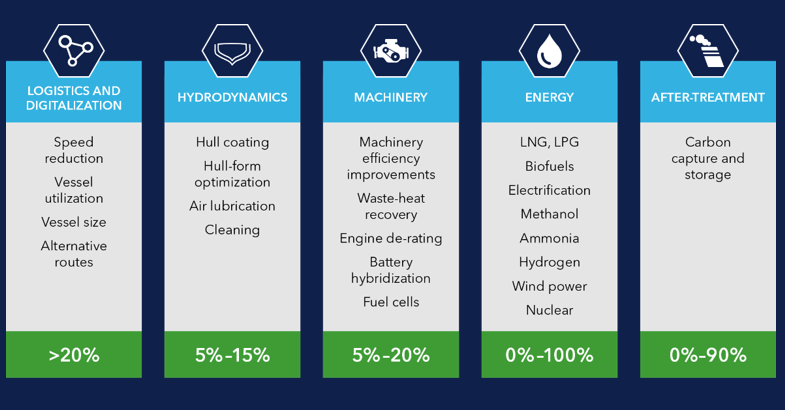
The types of technologies that someone could lean on are related to either technical or operational measures. Taking carbon capture technology as an example, it is undoubtedly an innovative technology that could be pivotal for future retrofits, but it comes along with energy penalties and the necessary infrastructure for the disposal of CO2 at ports.
In any case, the time is ripe for comprehensive planning, addressing challenges like energy losses and considering alternatives such as wind-assisted propulsion or solar panels on vessels, recognizing that applicability varies across routes.
Technical considerations and alternative fuels
Delving into the technicalities, there are many different paths that help reduce emissions, such as:
- Reducing energy demand and improving operations.
- Improving power production (the energy converters), a field that engine manufacturers have been exploring for years.
- Changing the fuels
- Exploring new energy sources onboard vessels, such as wind assisted propulsion and solar panels,.
Alas, it is important to keep in mind that not every path is applicable everywhere. Planning for decarbonization means understanding the solutions and opting for those that fit the situation at hand.
Furthermore, alternative fuels like hydrogen, ammonia, and biofuels present promising avenues, albeit with barriers such as cost, lack of infrastructure, availability, and return on investment.
Additionally, when talking about alternative fuels, the human factor, including crew training and safety considerations, becomes pivotal to addressing various risks, such as the degradation of machinery. These facts once again emphasize the importance of collaboration in finding solutions that align with industry goals.
So, it is also important to note that there are always going to be barriers when navigating a new landscape. However, it is nothing that cannot be overcome with proper planning and opting for the right solutions.
Wind-assisted propulsion
Are we going back to having sails onboard ships? Not necessarily, but the idea has potential for particular routes.
Through analysis and real operational data, it becomes evident that there is the potential to improve efficiency by up to 11% or even more. While this prospect is attractive, it’s crucial to note that it’s not universally applicable to all routes. Therefore, a comprehensive study ought to be undertaken.
Carbon capture: challenges and opportunities
Carbon capture offers promise, but its implementation depends on technology types and the capacity for capture, treatment, and storage. Additionally, liquefying CO2 introduces additional considerations akin to the use of scrubbers, highlighting the importance of cost justifying investments.
Planning ahead: Collaboration and Integration
To plan ahead, understanding these challenges is imperative. Crafting a decarbonization plan involves aligning with ESG targets, evaluating technical and operational solutions, and fostering collaborations.
In navigating this intricate landscape, we find both challenges and opportunities, setting the stage for a transformative journey towards a greener maritime future.
The views presented are only those of the author and do not necessarily reflect those of SAFETY4SEA and are for information sharing and discussion purposes only.
Above article is a transcript from Dr. Chara Georgopoulou’s presentation during the 2024 SAFETY4SEA Limassol Forum with minor edits for clarification purposes.
Explore more by watching her video presentation here below








